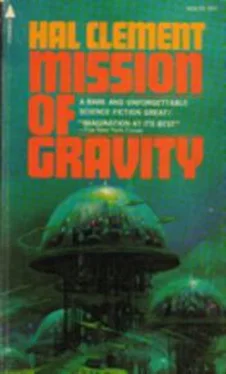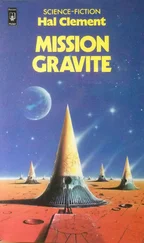Hal Clement - Mission of Gravity
Здесь есть возможность читать онлайн «Hal Clement - Mission of Gravity» весь текст электронной книги совершенно бесплатно (целиком полную версию без сокращений). В некоторых случаях можно слушать аудио, скачать через торрент в формате fb2 и присутствует краткое содержание. Жанр: Фантастика и фэнтези, на английском языке. Описание произведения, (предисловие) а так же отзывы посетителей доступны на портале библиотеки ЛибКат.
- Название:Mission of Gravity
- Автор:
- Жанр:
- Год:неизвестен
- ISBN:нет данных
- Рейтинг книги:4 / 5. Голосов: 1
-
Избранное:Добавить в избранное
- Отзывы:
-
Ваша оценка:
- 80
- 1
- 2
- 3
- 4
- 5
Mission of Gravity: краткое содержание, описание и аннотация
Предлагаем к чтению аннотацию, описание, краткое содержание или предисловие (зависит от того, что написал сам автор книги «Mission of Gravity»). Если вы не нашли необходимую информацию о книге — напишите в комментариях, мы постараемся отыскать её.
Mission of Gravity — читать онлайн бесплатно полную книгу (весь текст) целиком
Ниже представлен текст книги, разбитый по страницам. Система сохранения места последней прочитанной страницы, позволяет с удобством читать онлайн бесплатно книгу «Mission of Gravity», без необходимости каждый раз заново искать на чём Вы остановились. Поставьте закладку, и сможете в любой момент перейти на страницу, на которой закончили чтение.
Интервал:
Закладка:
It was also necessary to see to the food question; it was not, as he had told Lackland, really pressing, but more work with the nets was going to be necessary from now on. The river itself, now about two hundred yards wide, appeared to contain fish enough for their present needs, but the land was much less promising. Stony and bare, it ran a few yards from one bank of the stream to end abruptly against the foot of (he cliff; from the other, a series of low hills succeeded each other for mile after mile, presumably far beyond the distant horizon. The rock of the escarpment’s face was polished glass-smooth, as sometimes happens even on Earth to the rocks at the sliding edges of a fault. Climbing it, even on Earth, would have required the equipment and body weight of a fly (on Mesklin, the fly would have weighed too much). Vegetation was present, but not in any great amount, and in the first fifty days of their stay no member of the Bree’s crew saw any trace of land animal lif e. Occasionally someone thought he saw motion, but each time it turned out to be shadows cast by the whirling sun, now hidden from them only by its periodic trips beyond the cuff. They were so near the south pole that there was no visible change in the sun’s altitude during the day.
For the Earthmen, the time was a little more active. Four of the expedition, including Lackland, manned the rocket and dropped planetward from the rapidly moving moon. From their takeoff point the world looked rather like a pie plate with a slight bulge in the center; the ring was simply a line of light, but it stood out against the background of star-studded blackness and exaggerated the flattening of the giant world.
As power was applied both to kill the moon’s orbital velocity and bring them out of Mesklin’s equatorial plane the picture changed. The ring showed for what it was, but even the fact that it also had two divisions did not make the system resemble that of Saturn. Mesklin’s flattening was far too great for it to resemble anything but itself — a polar diameter of less than twenty thousand miles compared to an equatorial one of some forty-eight thousand has to be seen to be appreciated. All the expedition members had seen it often enough now, but they still found it fascinating.
The fall from the satellite’s orbit gave the rocket a very high velocity, but, as Rosten had said, it was not high enough. Power had to be used in addition; and although the actual pass across the pole was made some thousands of miles above the surface, it was still necessary for the photographer to work rapidly. Three runs were actually made, each taking between two and three minutes for the photography and many more for the whipping journey around the planet. They made reasonably sure that the world was presenting a different face to the sun each time, so that the height of the cliff could be checked by shadow measurements on all sides; then, with the photographs already fixed and on one of the chart tables, the rocket spent more fuel swinging its hyperbola into a wide arc that intercepted Toorey, and killing speed so that too much acceleration would not be needed when they got there. They could afford the extra time consumed by such a maneuver; the mapping could proceed during the journey.
Results, as usual with things Mesklinite, were interesting if somewhat surprising. In diis case, the surprising fact was the size of the fragment of planetary crust that seemed to have been thrust upward en bloc. It was shaped rather like Greenland, some thirty-five hundred miles in length, with the point aimed almost at the sea from which the Bree had come. The river leading to it, however, looped widely around and actually contacted its edge at almost the opposite end, in the middle of the broad end of the wedge. Its height at the edges was incredibly uniform; shadow measurements suggested that it might be a trifle higher at the point end than at the Bree’s present position, but only slightly.
Except at one point. One picture, and one only, showed a blurring of the shadow that might be a gentler slope. It was also in the broad end of the wedge, perhaps eight hundred miles from where the ship now was. Still better, it was upstream — and the river continued to hug the base of the cliff. It looped outward at the point where the shadow break existed as tiiough detouring around the rubble pile of a collapsed slope, which was very promising indeed. It meant diat Barlennan had sixteen or seventeen hundred miles to go instead of fifty, with half of it overland; but even the over-
land part should not be overwhelmingly difficult. Lackland said so, and was answered with the suggestion that he make a more careful analysis of the surface over which his small friend would have to travel. This, however, he put off until after the landing, since there were better facilities at the base.
Once there, microscopes and densitometers in the hands of professional cartographers were a little less encouraging, for the plateau itself seemed rather rough. There was no evidence of rivers or any other specific cause for the break in the wall that Lackland had detected; but the break itself was amply confirmed. The densitometer indicated that the center of the region was lower than the rim, so that it was actually a gigantic shallow bowl; but its depth could not be determined accurately, since there were no distinct shadows across the inner portion. The analysts were quite sure, however, that its deepest part was still well above the terrain beyond the cliffs.
Rosten looked over the final results of the work, and sniffed.
„I’m afraid that’s the best we can do for him,” he said at last. „Personally, I wouldn’t have that country on a bet even if I could live in it. Charlie, you may have to figure out some way to give moral support; I don’t see how anyone can give physical.”
„I’ve been doing my best all along. It’s a nuisance having this crop up when we were so close to home plate. I just hope he doesn’t give us up as a bad job this close to the end; he still doesn’t believe everything we say, you know. I wish someone could explain that high-horizon illusion to his — and my — satisfaction; that might shake him out of the notion that his world is a bowl, and our claim to come from another is at least fifty per cent superstition on our part.”
„You mean you don’t understand why it looks higher?” one of the meteorologists exclaimed in a shocked tone.
„Not in detail, though I realize the air density has something to do with it.”
„But it’s simple enough — ”
„Not for me.”
It’s simple for anyone. You know how the layer of hot air just above a road on a sunny day bends sky light back upward at a slight angle, since the hot air is less dense and the light travels faster in it; you see the sky reflection and tend to interpret it as water. You get more extensive mirages sometimes even on Earth, but they’re all based on the same thing — a ‘lens’ or ‘prism’ of colder or hotter air refracts the light. It’s the same here, except the gravity is responsible; even hydrogen decreases rapidly in density as you go up from Mesklin’s surface. The low temperature helps, of course.”
„All right if you say so; I’m not a — ” Lackland got no chance to finish his remark; Rosten cut in abruptly a and grimly.
„Just how fast does this density drop off with altitude?”
The meteorologist drew a slide rule from his pocket and manipulated it silently for a moment.
„Very roughly, assuming a mean temperature of minus one-sixty, it would drop to about one per cent of its surface density at around fifteen or sixteen hundred feet.” A general stunned silence followed his words.
„And — how far would it have dropped at — say — three hundred feet?” Rosten finally managed to get the question out.
Читать дальшеИнтервал:
Закладка:
Похожие книги на «Mission of Gravity»
Представляем Вашему вниманию похожие книги на «Mission of Gravity» списком для выбора. Мы отобрали схожую по названию и смыслу литературу в надежде предоставить читателям больше вариантов отыскать новые, интересные, ещё непрочитанные произведения.
Обсуждение, отзывы о книге «Mission of Gravity» и просто собственные мнения читателей. Оставьте ваши комментарии, напишите, что Вы думаете о произведении, его смысле или главных героях. Укажите что конкретно понравилось, а что нет, и почему Вы так считаете.












